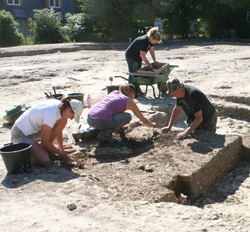New archaeological dig to investigate the birth of Christianity in Anglo-Saxon England
Release Date 24 July 2012

The University of Reading has been awarded funding for a research project aiming to transform our understanding of how Christianity impacted daily life in Anglo-Saxon England.
Dr Gabor Thomas and his team will begin excavating the village green of Lyminge in Kent this July. Previous excavations have shown that extensive remains of an Anglo-Saxon monastery and an earlier royal complex lie preserved literally inches beneath the green and other open areas of the village. The aim of the forthcoming campaign is to uncover more secrets dating to the period when Christianity was first established amongst the pagan Anglo-Saxons of Kent.
Dr Thomas said: "This is potentially the most important Anglo-Saxon excavation in a generation since Lyminge provides a unique opportunity to examine an Anglo-Saxon monastery on a large scale, and in relation to an earlier Anglo Saxon royal complex. This will be the first time such a complex will be uncovered in Kent, an area where the church was first established in Anglo-Saxon England.
"These complexes were settlements temporarily occupied by a king and his royal retinue where renders of food and other produce were consumed and redistributed to loyal followers. These seasonal gatherings provided opportunities for public assembly, the promulgation of laws and cult displays."
Potential finds include evidence for aristocratic display including large timber halls, glass drinking vessels and elaborate dress-fittings. The team also expect to find evidence for feasting rituals and such crafts as weaving and metalworking.
Dr Thomas continued: "This is a unique opportunity to gain a glimpse of aristocratic culture in Kent on the eve of the Anglo-Saxon conversion, as we have no understanding of the form, layout and built environment of these royal centres in the county. We are interested in discovering how monasteries may have altered traditional Anglo-Saxon attitudes to organising settlements, building houses, burying the dead, and food and diet. All this may have changed as a result of the implantation of a Christian world-view into settlements where monasteries were founded."
Dr Thomas has been excavating sites in Lyminge since 2008. In 2010 his team found Anglo-Saxon England's first iron plough coulter, a unique discovery which could mean that the medieval countryside of Kent was forged 400 years earlier than previously thought.
Dr Thomas added: From what has been found during previous investigations we're very excited about our prospects for this new dig," continued Dr Thomas. "As well as shedding light on the Anglo-Saxon Lyminge's pre-Christian origins, our new work we will undoubtedly uncover more evidence for the monastery that succeeded it in the 8th and 9th centuries."
Funded by the Arts and Humanities Research Council, the project will run for three years. Uniquely the project will harness expertise across the academic, commercial and volunteer sectors through local collaborations with the Kent Archaeological Society and Canterbury Archaeological Trust. The partnership will promote knowledge transfer and deliver a full package of public outreach and educational activities throughout the project.
ENDS
For all media enquiries please contact James Barr, University of Reading Press Officer on 0118 378 7115 or by email on j.w.barr@reading.ac.uk
Follow us on Twitter | Like us on Facebook | Read our research blog 'The Forum'
Notes for Editors
The University of Reading's Department of Archaeology has an international reputation in research and teaching. The University was awarded the Queen's Anniversary Prize 2009 in recognition of the excellence of the archaeology department, which, uniquely within the study of archaeology, combines ground-breaking research, enterprise and teaching.
The University of Reading is ranked among the top 1% of universities in the world (THE World University Rankings 2011-12), is among the top 20 universities in the UK for research funding, and according to students has the best campus environment in the UK (THE Student Experience Survey).
